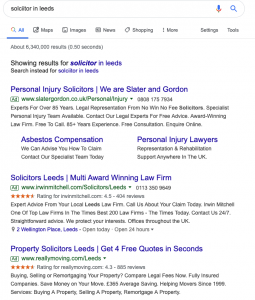Pay Per Click (PPC) is an online advertisement opportunity used by organisations paying the search engine to drive traffic to a website when their advertisement is clicked. Organisations typically bid on keyword phrases relevant to their target market and service lines.
The mechanism behind PPC is simple. Search engines, like Google, Bing, and Yahoo, auction off advertising space on their result pages (SERPs). These advertisements sit at the top and/or the side of the SERPs, clearly separated from the ‘organic’ search results ie results that have not been paid for.
Figure 1 shows the Google SERP for the search term ‘solicitor in Leeds’. The first organic result on this page is from Slater Gordon, which is located at the top of PPC ads indicated by the green ‘Ad’ box.
The PPC ads are located in the top of the page, and in the bottom of the page. These organisations — Slater Gordon, Irwin Mitchell and Really Moving –have all set up a PPC campaign through Google Adwords, setting an amount they will pay when someone clicks on one of their links.
Let’s say Slater Gordon, as an advertiser, has bid 10pence per click for this ad. If 100 people click on the PPC ad, Slater Gordon will pay Google £10.0, whether or not these site visitors click away from the site straight away or don’t end up buying Slater Gordon’s services.
Why is PPC relevant to legal service providers?
Legal service providers need to recognise how important search engines are in reaching existing, target and prospective clients. More and more people conduct information searches online via search engines, and as such, competing for search engine visibility is a crucial marketing goal.
PPC is a great way for legal service providers to gain instant traffic to their sites by becoming immediately visible for certain keywords. If an organisation is in need of new business or leads, PPC can deliver targeted visitors to a site, but PPC should never replace good SEO. SEO efforts are long-lasting, while PPC lasts only as long as the budget.
While PPC offers immediate results (assuming people are searching for your keywords!), it can also be very expensive and cost ineffective. A PPC ad may bring a lot of traffic, but that traffic may not be converted into leads generated.
To make the most of PPC, legal service providers need to take a targeted approach, being focused on their keywords, and monitor results carefully. One of the best features of PPC is that they are highly flexible, as organisations can manage them through Google Adwords, adjusting or removing their ads quickly if they are not producing the desired return on investment.
How to make PPC work for your firm
PPC can be used to help meet objectives around increasing website traffic and generating revenue online. It is a popular advertising tool, but is not always used as effectively or efficiently as it could be. Advertisers often end up paying a substantial amount for targeted keywords, but later discover that they are not seeing an increase in visitors or leads.
The following points will help you consider how PPC could work for your organisation:
- Select keywords carefully. Short-tail keywords – the most common and simple keywords – cost more and lead to fewer conversions than long-tail keywords – the more specific and descriptive. Consider choosing long-tail keywords focused on the niche(s) your organisation has to offer. Long-tail keywords tend to be less expensive and are more likely to lead to conversions, because the results are closer to what searchers are looking for. Searchers are pretty savvy now and understand that the more descriptive they are in their search terms, the more quickly they will find results relevant to their search.
- Create a compelling ad. Just because you have paid for and secured the top slot on the SERP, doesn’t mean the user will click your link. The ad itself makes all the difference. Google Adwords provides an easy to use ‘wizard’ to create your ad. You just need to ensure the wording is targeted to your user, uses keywords and promotes your service accurately.
- Measure conversions as well as click-throughs. A good PPC ad will generate increased traffic to your site, but if the additional traffic does not convert into actual work, then the ad needs to be re-written or your money is essentially wasted. Keep track of how many clicks turn into clients to truly measure the return on investment.
- Monitor performance on an ongoing basis. Even the best PPC ads need to be adjusted over time to stay effective. A benefit of PPC is that it is completely flexible and manageable by an organisation. If there is a change in results (perhaps a competitor has upped its budget for the same keywords, meaning a drop in your results, or perhaps a competitor has stopped competing for keyword, in which case you can bid for the same keywords at a lower cost to maintain your position). Search habits and patterns of searchers can also shift, affecting the value of certain keywords. If a PPC campaign is costing more than you are generating in increased profits, or not providing the increased exposure desired, the ad needs to be quickly adjusted or pulled altogether.
Summary
While PPC offers immediate results (assuming people are searching for your keywords!), it can also be expensive and cost ineffective, depending on the level of competition for your chosen keywords.
Organisations should keep in mind that 80% of searchers still prefer to click on organic results (the ones in the white, main body in the graphic), rather than on PPC ads, so it will be important to pursue SEO alongside any PPC activity to ensure a longer term and more sustainable search engine presence.


